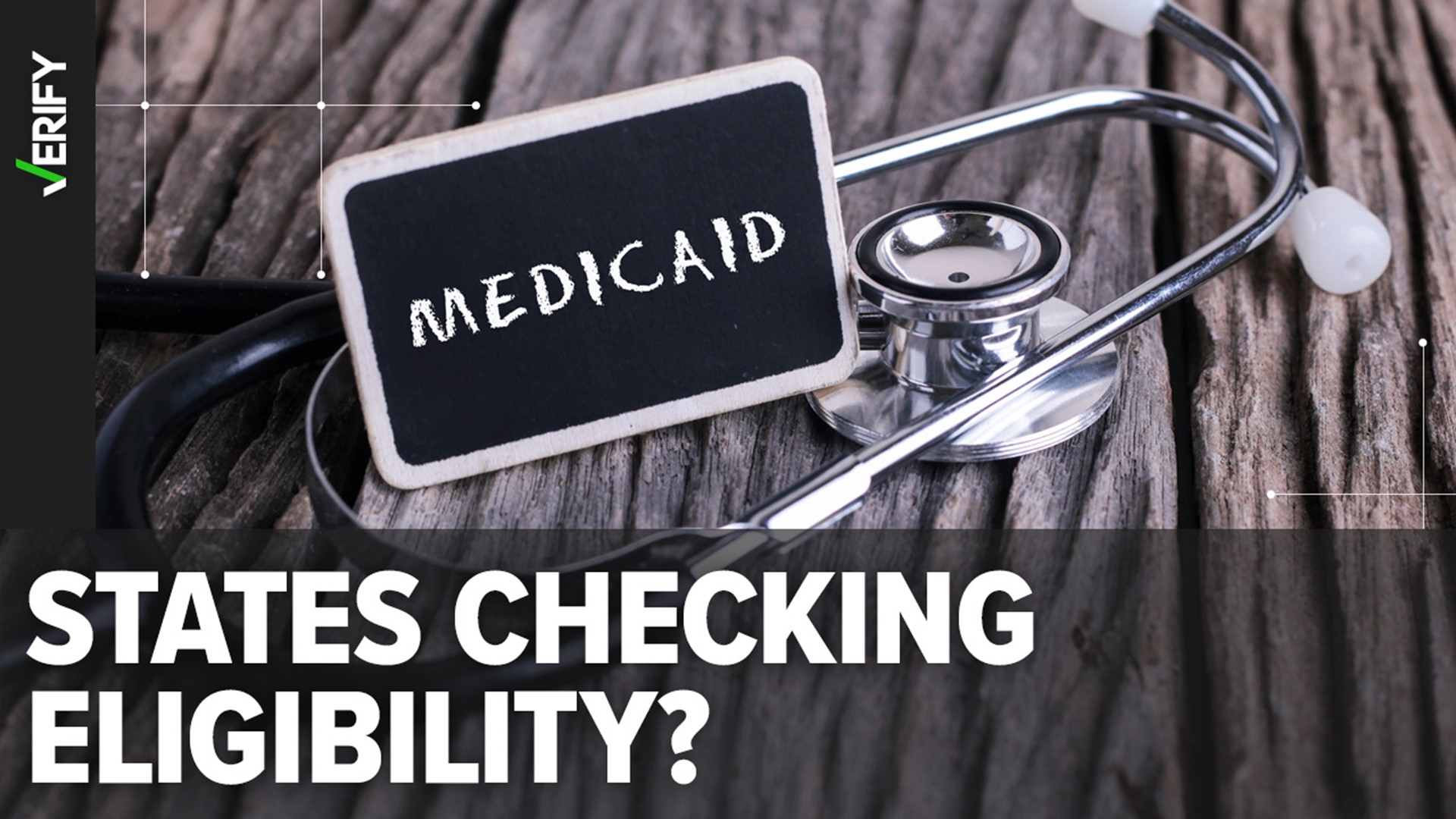UPDATE (5/30/23): In late February, the Center for Medicare and Medicaid Services released a list of each state's expected timeline for beginning renewals and terminations. Every state restarted the renewal process between February and April. Although some states expected they'd begin terminating certain Medicaid enrollees in April or May, most states projected they'd begin terminating enrollees in June or July. One state, Oregon, said it would begin terminating enrollees in October.
States have been required to provide continuous Medicaid coverage to enrollees since March 2020 because of a pandemic-response law called the Families First Coronavirus Response Act. The law incentivized states to pause all disenrollments for Medicaid and the Children's Health Insurance Program (CHIP), even when people became ineligible. These two programs provide health insurance to low-income adults and children.
But the continuous coverage mandate ended in March 2023. VERIFY reader Thomas texted us to ask about what people need to do now to keep their coverage.
THE QUESTION
Are states re-checking people’s eligibility for Medicaid and CHIP beginning in April?
THE SOURCES
- Consolidated Appropriations Act, 2023
- Centers for Medicare and Medicaid Services (CMS)
- Center for Medicaid and CHIP Services
- Louise Norris, health policy analyst for Healthinsurance.org
THE ANSWER
Yes, states are re-checking people’s eligibility for Medicaid and CHIP, and can begin disenrolling ineligible people, as well as some people who haven’t filled out a renewal form, in April.
WHAT WE FOUND
Beginning in April, states can once again disenroll ineligible people from Medicaid and Children’s Health Insurance Program (CHIP) because of rules set in a 2022 congressional budget bill.
The law requires states to reassess who is eligible for coverage.
Because of this, states will restart a renewal process for all Medicaid and CHIP enrollees. This will be automatic for some people, while others will have to fill out a renewal form, depending on how much information the state already has.
More from VERIFY: No, Medicaid coverage is not coming to an end in July
States are required by the Centers for Medicare and Medicaid Services (CMS) to unwind the continuous enrollment provision and begin the renewal process for all enrollees over the next year.
CMS requires that states first try to use the information they have on hand to check if enrollees are still eligible for Medicaid or CHIP coverage. If your state has what they need to determine you’re still eligible, then you don’t have to do anything. Your eligibility will be renewed and you’ll remain on Medicaid.
If your state needs more information from you to determine your eligibility, they’ll first try to send you a renewal message in the mail, the Center for Medicaid and CHIP Services says. States are also required by CMS to try to contact people by other means, such as email or text message, if their mail is returned. So you’ll want to make sure your state has your updated contact information and address ahead of time.
You’ll have at least 30 days to submit documents if they’re required for your renewal and you’re enrolled based on your income, CMS says. Other enrollees required to submit documents will have a “reasonable period of time” to do so.
But even with a month to submit documents, you should still fill out your renewal form and mail it back to your state as soon as possible if you get one, the Center for Medicaid and CHIP Services says.
"If you ignore your renewal packet from Medicaid, you get disenrolled if they can't automatically renew you with the information they have on file," Louise Norris, health policy analyst for Healthinsurance.org, told VERIFY sister station WCNC.
If your state does determine you’re ineligible, you’ll be given a notice at least 10 days before your Medicaid coverage is terminated or reduced. This gives you a chance to appeal your eligibility and determination before your state changes your coverage.
Checking on the status of your renewal depends on the state because each state handles their own Medicaid and CHIP programs differently. For example, in some states, such as California and North Carolina, you can apply for renewal through an online portal, and check on the status of your renewal there.
The Center for Medicaid and CHIP Services has links to every state’s enrollment website and phone numbers, as well as profiles detailing each state’s Medicaid and CHIP programs.
The U.S. Department of Health and Human Services and the Kaiser Family Foundation both predict millions will lose Medicaid or CHIP coverage in the year following the end of the continuous enrollment provision. Many of those people will become ineligible because of changes in income. Other people who are still eligible are at risk of losing coverage because of administrative issues, difficulties in renewing and short-term changes in circumstances that cause a person to fluctuate between being eligible and ineligible.
If you’re disenrolled but believe you’re still eligible for Medicaid, you can immediately reapply.
If you no longer qualify for Medicaid, you may be able to buy a health plan through the Health Insurance Marketplace that’s less than $10 a month, the Center for Medicaid and CHIP Services says. You’ll enter into a special enrollment period to change healthcare plans if you’re disenrolled from Medicaid.
Finally, some states offer an additional option with the Basic Health Program, the Center for Medicaid and CHIP Services says. The Basic Health Program is designed for people whose income frequently fluctuates in and out of eligibility for Medicaid and CHIP, as well as for low-income people who generally don’t qualify for Medicaid or CHIP.
WCNC contributed reporting for this story.












